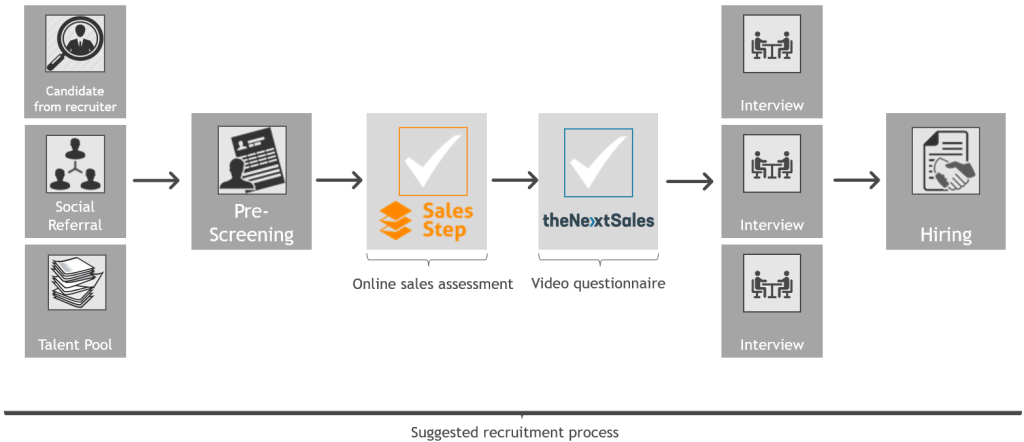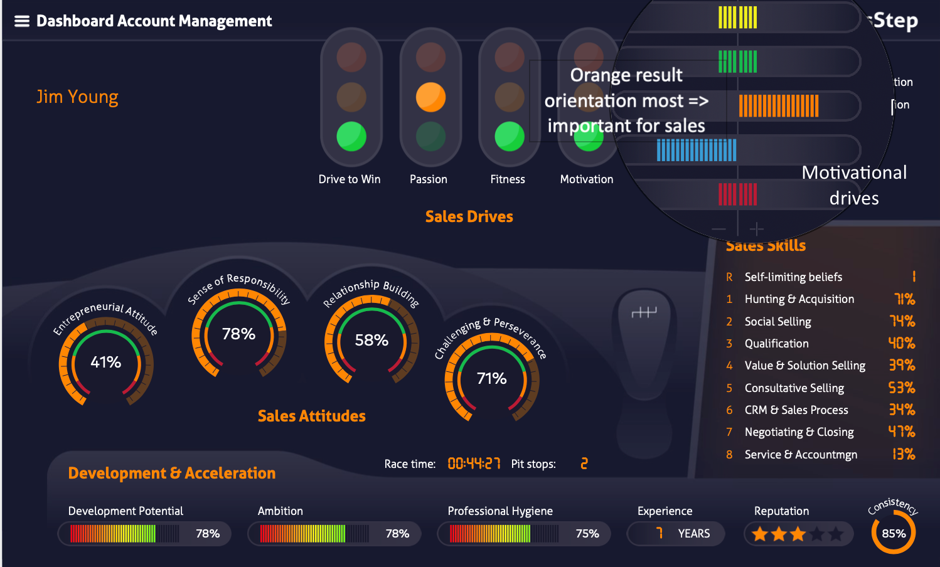Douglas Huissen voert onderzoek uit naar de impact van Generatie Z op sales en acquisitie, met focus op Salesstep assessments. Het onderzoek richt zich op het meten van motivatieprofielen en het vinden van significante afwijkingen tussen Generatie X en Generatie Z. Er wordt een tekort aan ‘hunters’ in IT-teams benoemd, wat problemen oplevert voor acquisitie. De veranderende verkoopmethoden en de uitdagingen die dit met zich meebrengt worden besproken, waarbij pijn wordt genoemd als een sterkere motivator dan plezier, vooral in de verkoop. Het belang van het begrijpen van motivatie en persoonlijkheid in het sales team wordt benadrukt, evenals de noodzaak om de aanpak en leiderschapsstijl aan te passen om effectief te zijn in de omgang met Generatie Z in de verkoop.
Fleetcor ontdekt nieuw sales talent met transferable skills
SOCIAAL VERBAND
Zo zijn er ook vacatures bij Fleetcor Inc., een wereldwijd aanbieder van tank – en oplaadpassen en van mobiliteits – en betaaloplossingen in de zakelijke markt, die werkt onder diverse labels zoals Travelcard B.V. Peter van Hemert is Managing Director Travelcard B.V. & VP Sales Europe FLEETCOR. Hij stuurt rechtstreeks vijf salesteams aan die eerder onder lokaal management vielen, voor elf Europese landen. Fleetocor brengt oplossingen naar verschillende landen die uniform zijn en daarmee schaalbaar. De opdracht die Peter kreeg bij zijn aanstelling in 2021, was gericht op uniformiteit en culturele verbondenheid. Het doel was om door synergie tussen de landen meer resultaat te boeken dan de som der delen.
OMGEVING
Zit sales gewoonweg in je, of is het aan te leren? De stelling dat ‘sales in je zit,’ wordt ontkracht door diverse publieke en private opleiders die stellen dat het vak te leren is. Er zijn bijna 100 opleidingen Commerciële Economie in Nederland die uitgaan van een landelijk opleidingsprofiel. Ook private opleiders kennen op de praktijk gerichte leeruitkomsten, gericht op de ontwikkeling van skills. Deze opleidingen zijn breed en leiden op tot een veelvoud van functies. De vraag is waar werkgevers op selecteren. En in hoeverre helpt een ’skillsbased’ aanpak in het werving – en selectieproces om eventuele aanleg zichtbaar te maken? En heeft deze aanpak dan ook een voorspellende waarde voor succes?
Dit experiment gaat over ’transferable skills’, oftewel kunnen ontwikkelde skills in de ene functie en sector worden ingezet in een andere sector? Zo werd Felicia van London, die als Verpleegkundige werkte in de Zorg, samen met 49 andere sollitcitanten uitgenodigd voor een assessment met de tool van SalesStep. Dat gaf haar bevestiging van haar skills, zoals empathie (aanvoelen wat er bij anderen speelt en daar iets mee doen); stressbestendigheid (kalmte, rust, consistentie in handelend); communicative vaardigheden (duidelijk en to the point kunnen communiceren) et cetera. Kwaliteiten die zij nu dagelijks inzet in haar salesfunctie bij Travelcard. “De werksfeer in de Zorg was niet altijd leuk, maar ik heb wel goed leren luisteren naar wat mensen echt nodig hebben,” zo stelt ze. “Waar ik nu aan werk is wat strakker in een gesprek te zitten, want er moet natuurlijk wel wat verkocht worden.”
GEDRAGSPATRONEN
Peter stelt: “Ik zal nooit iemand diskwalificeren op vooropleiding en ik kijk nauwelijks naar het c.v.. Ik kijk naar wat iemand motiveert, wat die komt bregen en wil leren. Ik ben op zoek naar drijveren en of iemand het zich heeft om het vak to leren.”
MINDSET
Kenmerkend voor deze casus is het anders kijken en het gebruik van één uniforme tool over regio’s en daarmee culturen heen. De dashboards worden in de teams gebruikt en besproken voor individuele ontwikkeling en teambuilding. In de Europese teams spreekt men inmiddels de uniforme taal, met begrippen als ‘race time’ en ‘sales mindset’ en dat verbindt. De mindset is nu openheid over de eigen ontwikkeling.
ARENA
Het merendeel van de vacaturestellingen in Nederland vraagt om te solliciteren met het klassieke cv met aantoonbare relevante opleiding en werkervaring in de sector. Peter stelt: “Een c.v. wordt veelal toegeschreven naar de vacante functie. Een skillsaanpak haalt het echte profiel naar boven.” Waarom blijven we dan vasthouden aan het c.v., als dit maar beperkt bruikbaar lijkt te zijn? Is LinkedIn dan een betere oplossing? Vervolgonderzoek moet dit uitwijzen maar uit dit experiment blijkt in ieder geval dat talenten zijn geselecteerd op skills, die met een regulier c.v. zouden zijn afgewezen.
CULTUUR
De algemene bevinding over alle experimenten heen, is dat internationale grote bedrijven zoals Xebia en DHL in de andere experimenten, net als Fleetcor in dit experiement, al een stap verder lijken te zijn dan de corporates in Nederland. Ook die zijn door het Integraal Skillspaspoort Programma uitgenodigd voor ‘skillsbased’ experimenten, maar hebben vooralsnog een afwachtende houding.
HECHTHEID EN EERDERE POGINGEN
Peter heeft ook in zijn eerdere functies bij andere organisaties de functionaliteit van SalesStep toegepast, zoals bij T-Mobile Nederland. Bij Fleetcor heeft hij inmiddels 30% sales-omzetgroei gerealiseerd over de afgelopen drie jaar. Dat is voor een deel toe te schrijven aan zijn ‘skillsbased’ aanpak. “Sales is te leren, maar je moet er wel aanleg voor hebben,” zo stelt hij.
CULTUURVARIANT
In het model van Cultuurbeïnvloeding is hier volgens het Arenamodel een ‘gedragsstrategie’ toegepast, oftewel kleinere gedragsinterventies, door uit te gaan van een uniform basisprofiel over de landen heen, met een gemeenschappelijk begrippenkader dat gaandeweg is gaan leven in de Europese sales teams. Het leidde tot inzicht op individueel en teamniveau en synergie tussen de landen, met betere resultaten tot gevolg.
Best practice: Sales Recruitment in 2022
“People are not your most important asset. The right people are.”
Jim Collins
What a resume doesn’t tell you about the sales candidates
A resume tells you something about a salesperson, but it does not show everything. A great resume in sales can say something about a candidate’s loyalty by looking at their tenure. You can also get an idea of their overall performance or attainment. But it is tough to get an indication of their future performance based on their working history unless you know three things:
- What are their competencies and state of their Sales Mindset?
- Would you buy from this person? Do you trust him?
- What are their core drivers and motivators?

Together with our partner theNextSales, today we outline a better solution for uncovering those three aspects of your sales candidate and thus tackle this issue. Our joint solution consists of two proven successful tips:
1) an online sales assessment, whereby the sales candidate is asked to answer an extensive questionnaire early on in the recruitment process;
2) using video questionnaires as a means to demonstrate the candidate’s “true” skills in practice.
In the two paragraphs below, more insights will be shared into both parts of the solution and why they are relevant.
First tip: the use of an online sales assessment
The use of online assessments has skyrocketed in recent years. And within recruitment processes, assessments are too often used after the first or second interview (as a “sanity check”).
However, many candidates do not make it through the first selection round because they often do not have the right sector expertise or experience. We see this particularly in the sectors ICT, Finance and Manufacturing.
Our recommendation & observation:
1) It is more effective when hiring managers deploy online assessments earlier in the recruitment process. The best time to do this is just after the exploratory call but prior to the first round of interviews.
2) One benefit following from using assessments earlier in the recruitment process is that it allows hiring managers or recruiters to invite talented candidates who otherwise would have been outside of their scope due to specific requirements in the job description. For example the right education, sector expertise and or experience.
3) We see a remarkable number of what we call “Wild Card” candidates who are still successfully hired and onboarded. These Wild Card candidates can provide the answer to the challenge of the tight labor market.
Wild card candidates are therefore hidden gems who, based on their resume, often are not invited to an interview due to a lack of sector expertise but still have a lot of potential.
With the insights gained by a SalesStep assessment, it is a lot easier to identify and highlight these hidden gems. The assessments dig much deeper than the candidate’s resume by providing an extensive report on their Sales Drives, Motivational Drives, Sales Attitudes, Sales Skills, and development potential and ambition as well as Sales Mindset, which according to research, is more important than the level on experience in a similar job or the education level of the candidate. Furthermore, the light version of the SalesStep questionnaire – SalesStep-Select, takes as few as 15 minutes to complete, making it the perfect tool to use in the recruitment process (with high volume). Therefore, by implementing the online questionnaire SalesStep earlier in the recruitment process, hiring managers can gain deeper insights into the competencies and core drives of each candidate, thereby not missing wild card candidates or making wrong hires.
Second tip: the use of a video questionnaire
After a positive review of the SalesStep assessment and several candidates are selected, our next solution creates a modern alternative to the traditional hiring process. By providing a video questionnaire, we can more easily assess competencies and skills by seeing the competencies in practice. This will help the employer answer some questions before inviting someone for an interview. More importantly, it reduces the chance of a bad hire dramatically.
Sales competencies can easily be tested in the early stages by asking questions and providing small video assignments. Let us give you some examples of competencies that can be reviewed before meeting a candidate.
1 – Facilitation skills
Assignment: Make an intro, present the agenda and set the stage
How does a salesperson set the stage? Is the seller convincing in controlling the frame by selling the process first before asking questions or presenting something?
2 – Presentation skills
Assignment: Present our company in a storytelling way in under 2 minutes
Although a salesperson can practice a bit, you can’t fake a great presentation. Does the candidate know how to build a pitch and draw attention in the first 10 seconds? What technique is the seller using, and what is his vocabulary?
3 – Personality
Assignment: What would you do if…
Provide your candidate with a challenging situation with a fictional customer that is very demanding and is asking for more discounts. Ask him or her how he would solve this and why? This provides great insight into their personality
4 – Creativity
Assignment: Connection request
Show a LinkedIn profile of a famous CEO. Ask the seller to make a short video for this potential connection in 20 seconds and provide the candidate with some additional details about this person.
5 – Give energy
Would you be able to confidently say that this person is someone you would buy from? Of course not. Subconsciously you know before you know, and good energy is an invaluable asset for every seller. Especially in a digital era, it’s important to spice up your performance and increase the overall buying experience. With video, you will get a more complete impression.
Conclusion:
By presenting two tips, we have suggested an enhanced structure for the recruitment process that is more robust and future-proof. Implementing these will result in better hiring decisions, by reducing the number of wrong hires and increasing the number of candidates by successfully identifying Wild Card candidates.
A more elaborate presentation of our suggestions is illustrated in the graphic below:

If you would like to learn more about SalesStep or video recruitment, you can contact us via info@salesstep.com or theNextSales via info@thenextsales.nl.
WILD CARD SALES CANDIDATES
SalesStep’s advies om sneller sales vacatures in te vullen
Door het nijpende tekort op de arbeidsmarkt, zijn ondernemers en recruiters koortsachtig op zoek naar nieuwe creatieve manieren om hun (sales) vacatures in te vullen.
Bij SalesStep zien we daarom het aantal aanvragen voor Candidate assessments sterk toenemen.
De inzet van online assessments heeft de laatste jaren een enorme vlucht genomen. En binnen het rekruteringsproces worden assessments vaak ingezet na het eerste of tweede interview (als “sanity check”). Veel kandidaten komen echter niet door de eerste selectie ronde omdat ze vaak niet de juiste sector expertise of ervaring hebben. We zien dit met name in de ICT, Finance en Industrie- sectoren.

Door eerder in het proces online assessments in te zetten (eerste shifting na de sanity check) EN niet direct kandidaten af te wijzen die niet de juiste sector expertise en ervaring hebben, zien we opvallend veel “Wild Card” kandidaten die toch succesvol aangenomen worden. Dat zijn kandidaten die op basis van hun CV vanwege een gebrek aan sectorexpertise vaak niet uitgenodigd worden op gesprek, maar toch veel potentieel hebben. SalesStep kijkt dieper dan dat, en meet de Sales Mindset, ontwikkelbaarheid en potentie van een verkoper. Deze Wild Cards zijn de ‘hidden gems’ die een uitkomst bieden bij een krappe arbeidsmarkt als deze.
Daarom kregen we de vraag: SalesStep: Hoe zit dit precies? Wij hebben dit recent onderzocht bij 39 van onze partners en klanten.
Vraag: Wat is doorslaggevend voor het succesvol aannemen en onboarden van nieuwe salesmensen?
We hebben 5 selectiecriteria onderzocht die tijdens het recruitment proces gebruikt worden door onze klanten:
-
- Juiste ervaring in het vakgebied
- Sector expertise
- Sales Vaardigheden
- Opleidingsniveau
- Sales Mindset (o.a. Motivatie*)
We hebben deze vraag met de criteria vervolgens onderzocht bij onze klanten en partners die succesvol SalesStep inzetten in het rekruteringsproces:
Hier zijn de (verrassende) resultaten uit ons onderzoek:
1) Sales Mindset (o.a. Motivatie*) 31%
2) Juiste ervaring in het vakgebied 24%
3) Opleidingsniveau 18%
4) Sector expertise 12%
5) Sales Vaardigheden 10%
6) Anders 5%
Niet de juiste sector expertise of ervaring maar de juiste Sales Mindset is overduidelijk het doorslaggevende criterium voor het toekomstige succes van de Sales kandidaat.
Als we dit nu weten, wat kunnen we doen om de criteria en het rekruteringsproces anders vorm te geven?
Onze aanbeveling:
“Wild Card” sales kandidaten eerder door een online assessment laten toetsen en minder selecteren op de traditionele criteria ervaring en sector expertise.

Veel succes!
Vragen: info@salesstep.com
*Met Sales Mindset bedoelen we o.a. Drive To Win, Passie, Motivatie, Drijfveren, Mentale Weerbaarheid en Sales Attitudes
“Wrong Hires” in Sales
"Wrong Hires" in Sales– an undesirable phenomenon for hiring managers worldwide
When hiring salespeople, every employer wants to make the right decision and hire the most suitable candidate for a specific role in their sales team. Often, however, there are certain characteristics of a sales candidate that aren’t easily spotted during the recruitment phase. Examples are Mental Fitness, Motivational Drives and development potential. This results in employers making decisions that later prove to be a mistake or as it is often called a “Wrong Hire”.
To validate this hypothesis, we conducted a research survey among our 40 partners and over 1000 users globally. The results of this survey show us that 67% of the respondents have experienced a “Wrong Hire” in Sales.
This is a staggering number of wrong hires if we would extrapolate this to the total number of hiring decisions a commercial manager has fulfilled during his or her professional career.

Moreover, wrong hires are considered very costly to a company in several ways. Example of associated costs of “Wrong Hires” are: opportunity losses, direct and indirect costs.
To begin, we have 𝘥𝘪𝘳𝘦𝘤𝘵 𝘤𝘰𝘴𝘵𝘴. These are the costs incurred during the recruitment process, and they involve, for example, hiring an external or internal recruiter, scheduling and conduct the interview etc. What these costs also include is the training you provide the newly hired with. Therefore, direct costs of a bad hire, according to the U.S. Department of Labor, are at least 30% of the employee’s first-year earnings.
However, much more significant are the “hidden” 𝘪𝘯𝘥𝘪𝘳𝘦𝘤𝘵 𝘤𝘰𝘴𝘵𝘴 involved in wrong hires. An example for such costs is decreased productivity not only of the wrong hire, but also of the whole team since working in a team is based on interdependency and the actions of a single employee affects the results of the team as a whole. This leads to further delays in the business and therefore, potential loss of clients. Furthermore, a wrong hire may damage the company’s reputation by not delivering the service level and the customer experience that a customer expects of the company.
Furthermore, there are 𝘰𝘱𝘱𝘰𝘳𝘵𝘶𝘯𝘪𝘵𝘺 𝘭𝘰𝘴𝘴𝘦𝘴 associated with hiring the wrong person. One of them is the time allocated for onboarding and training of a wrong hire. This time is considered a loss due to the fact that it could be utilized in a different, more productive way – namely, by being devoted to people that deserve the coaching and attention. Another example is the loss of potential customers. Similar to retaining the existing customers, wrong hires frequently miss the opportunity to acquire new customers for the company due to their lack of motivation and decreased productivity.
All things considered, the overall costs of a “Wrong Hire” can go 𝗴𝗼 𝗮𝘀 𝗵𝗶𝗴𝗵 𝗮𝘀 $𝟭𝟬𝟬.𝟬𝟬𝟬.
Given the all these significant costs and the results of our survey, we can conclude that “Wrong Hires” are a very common problem that costs firms not only a tremendous amount of money, but it also harms the image of the firm and hinders its development.
The good news – we now have an excellent solution!
SalesStep-Select - the sales candidate assessment
SalesStep-Select is a shorter version of the successful SalesStep online sales assessment.
It is specifically catered for selecting Salespeople, effective recruitment and uncovering the actual state of their Sales Mindset. It takes only about 15 minutes to fill in and measures 15 sales competencies and will cost you only 50 euros. Therefore, it’s the perfect tool for avoiding wrong hires! With SalesStep-Select we are committed and convinced that your Wrong-Hire rate drops with the staggering 80%!
Hoe ziet ‘goed’ eruit bij het rekruteren van sales kandidaten?
Een belangrijk onderdeel van SalesStep zijn de drijfveren van sales mensen. Voor het verkrijgen van deze inzichten wordt het model van Dr. C Graves gebruikt. De kleuren geven zowel positieve als negatieve motiverende drijfveren aan waarbij Oranje staat voor Resultaatgerichtheid (Sales succes & -waardering).

Bij het werven van sales talent zien we vaak een sterke “passie” voor sales succes. Oranje is meestal de hoogste drijfveer voor verkopers.
Dit klinkt voor veel salesmanagers misschien als vanzelfsprekend, maar wist u dat meer dan 46% van de saleskandidaten een andere motivatie (en dus drijfveer) heeft? Gevolgen hiervan kunnen zijn: Verkeerde medewerkers en ineffectieve verkopers die hun doelen niet halen.
Wil je meer informatie?






